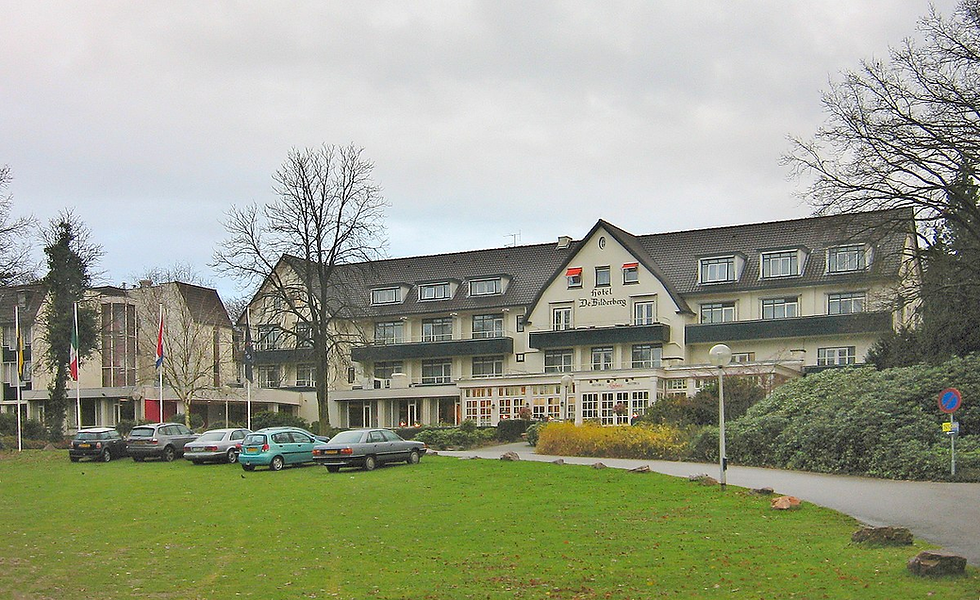The Bilderberg Group
- Marcelo Serafim
- Mar 22, 2024
- 5 min read
Updated: Apr 18, 2024
The Bilderberg Group, shrouded in secrecy and speculation, has long been a subject of fascination and intrigue. Founded in 1954, this exclusive annual conference brings together influential figures from politics, finance, industry, and academia to discuss pressing global issues. However, the group's closed-door meetings and lack of transparency have fueled numerous conspiracy theories about its true agenda and influence.
The Bilderberg Group is named after the Hotel de Bilderberg in Oosterbeek, Netherlands, where the inaugural meeting of the group took place in May 1954. The hotel was chosen as the venue for the meeting due to its secluded location and convenient facilities, providing a suitable environment for the gathering of influential figures from Europe and North America. Since then, the name "Bilderberg" has become synonymous with the secretive annual conferences organized by the group, attracting politicians, business leaders, academics, and other prominent individuals to discuss various global issues and geopolitical matters.
Origins and Purpose
The Bilderberg Group was established by Polish politician Józef Retinger and Prince Bernhard of the Netherlands, aiming to foster dialogue between Europe and North America in the aftermath of World War II. Initially, the group focused on strengthening ties between Western nations and promoting transatlantic cooperation to counter the spread of communism during the Cold War era.
Current Status and Participants
Today, the Bilderberg meetings continue to attract prominent figures from around the world, including political leaders, business tycoons, and influential intellectuals. Attendees discuss a wide range of topics, from geopolitics and economic trends to technological advancements and societal challenges. The list of participants is kept confidential, contributing to the group's aura of secrecy.

Alleged Conspiracies
Despite its stated goal of facilitating dialogue and collaboration, the Bilderberg Group has been the subject of numerous conspiracy theories. Critics allege that the group exerts undue influence over global affairs, shaping policies and decisions behind closed doors to serve the interests of a select elite. Some conspiracy theorists even claim that the group is part of a shadowy "New World Order" agenda to control the world's population.
Controversies and Criticisms
The Bilderberg meetings have faced criticism for their lack of transparency and accountability. Skeptics argue that the closed-door nature of the conferences undermines democratic principles and fosters an environment of elitism and privilege. Critics also raise concerns about potential conflicts of interest among attendees, as participants often represent powerful corporations and financial institutions.
The Bilderberg Group meetings have historically attracted a diverse array of influential individuals from various sectors. Here's a list of some prominent guests who have attended Bilderberg meetings:
Politicians:
Angela Merkel (Chancellor of Germany)
Emmanuel Macron (President of France)
Joe Biden (Former Vice President of the United States)
Henry Kissinger (Former U.S. Secretary of State)
Business Leaders:
Bill Gates (Co-founder of Microsoft)
Jeff Bezos (Founder of Amazon)
Warren Buffett (Chairman and CEO of Berkshire Hathaway)
Christine Lagarde (President of the European Central Bank)
Bankers and Financiers:
Jamie Dimon (CEO of JPMorgan Chase)
Larry Fink (CEO of BlackRock)
Mark Carney (Former Governor of the Bank of England)
Lloyd Blankfein (Former CEO of Goldman Sachs)
Journalists and Media Figures:
Charlie Rose (Former Host of The Charlie Rose Show)
Fareed Zakaria (Journalist and TV Host)
Andrea Mitchell (NBC News Chief Foreign Affairs Correspondent)
David Ignatius (Journalist and Columnist)
Academics and Think Tank Representatives:
Niall Ferguson (Historian and Senior Fellow at the Hoover Institution)
Joseph Stiglitz (Nobel Laureate in Economics)
Anne Applebaum (Historian and Pulitzer Prize-winning Journalist)
Richard Haass (President of the Council on Foreign Relations)
Royalty and Nobility:
Queen Beatrix of the Netherlands
Prince Philip, Duke of Edinburgh
Queen Sofia of Spain
Prince Charles, Prince of Wales
Tech Industry Leaders:
Eric Schmidt (Former CEO of Google)
Tim Cook (CEO of Apple)
Satya Nadella (CEO of Microsoft)
Elon Musk (CEO of SpaceX and Tesla)
Military and Intelligence Officials:
James Mattis (Former U.S. Secretary of Defense)
David Petraeus (Former Director of the CIA)
John Allen (Retired U.S. Marine Corps General)
James Jones (Former U.S. National Security Advisor)
This list is not exhaustive but provides a glimpse into the diverse range of individuals who have participated in Bilderberg meetings over the years.
Questions:
What is the purpose of the Bilderberg Group's annual conferences?
Why do critics raise concerns about the lack of transparency surrounding the group's meetings?
How has the Bilderberg Group been portrayed in popular culture and media?
What are some of the most prevalent conspiracy theories surrounding the Bilderberg Group?
How do the allegations of undue influence and elitism impact public perception of the group?
Vocabulary:
Shrouded - (adjective) covered or concealed from view; enveloped in mystery.
Speculation - (noun) the forming of a theory or conjecture without firm evidence.
Intrigue - (noun) the secret plotting of a scheme or conspiracy.
Transatlantic - (adjective) crossing or relating to the Atlantic Ocean.
Aura - (noun) a distinctive atmosphere or quality that surrounds a person, thing, or place.
Phrasal Verb: Bear out - to confirm or support (a theory, claim, or statement) with evidence.
Example: "The evidence presented at the trial bore out the defendant's innocence."
American Idiom: Behind closed doors - in secret; out of public view.
Example: "The negotiations took place behind closed doors, away from the prying eyes of the media."
English Grammar Tip: The Passive Voice
The passive voice in English is formed by using the auxiliary verb "to be" in combination with the past participle of the main verb. The basic structure is:
\[ \text{Subject} + \text{to be} + \text{past participle} + \text{by} + \text{agent (optional)} \]
Here's how to use the passive voice:
1. When the focus is on the action rather than the doer:
- Active: "The team won the championship."
- Passive: "The championship was won by the team."
2. When the doer is unknown or unimportant:
- Active: "Someone stole my bike."
- Passive: "My bike was stolen."
3. To emphasize the object of the action:
- Active: "The chef cooked a delicious meal."
- Passive: "A delicious meal was cooked by the chef."
4. In formal or academic writing:
- Passive voice is often preferred when the doer is irrelevant or when the action is more important than the subject.
5. To avoid assigning blame or responsibility:
- Active: "She made a mistake."
- Passive: "A mistake was made."
6. When discussing processes or instructions:
- Passive voice can be used to describe a series of actions without focusing on who performed them.
7. When reporting news or events:
- Passive voice is commonly used in news headlines and reports to make information sound more objective.
8. To create variety in writing:
- Alternating between active and passive voice can make writing more engaging and varied.
Example:
- Active: "The chef prepared the meal."
- Passive: "The meal was prepared by the chef."
Remember that while the passive voice has its uses, overuse can make writing dull or unclear. It's important to use it judiciously and consider the context and purpose of your writing.
Listening
Homework Proposal: Research and analyze a specific conspiracy theory or controversy surrounding the Bilderberg Group. Prepare a report outlining the origins of the theory, key proponents, evidence (if any), and counterarguments. Present your findings to the class and facilitate a discussion on the role of conspiracy theories in shaping public discourse.






Comments